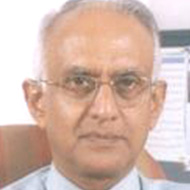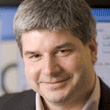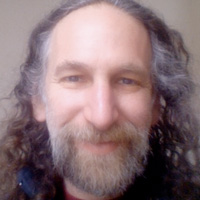Program IDA-30
- [ 17 - 18 June ]
- [ 19 - 20 June ]
- [ 24 September ]
- [ 31 October ]
- [ 11 November ]
November 11th
Location: Alan Turing, Campus Valla, Linköping
- 13.15 - 14.15
-
 Invited speaker:
Invited speaker:
Dr. Mathai Joseph, Advisor to Tata Consultancy Services
Presentation title:
Science, Technology & the Software Industry in India — History & Progress
[ Abstract & Profile ] - 14.15 - 14.30
- Coffee break
- 14.30 - 15.30
-
 Invited speaker:
Invited speaker:
Professor William H. Sanders, University of Illinois
Presentation title:
Challenges and Approaches for a Trustworthy Power Grid Cyber Infrastructure
[ Abstract & Profile ] - 15.30 - 15.45
- Coffee break
- 15.45 - 16.45
-
 Invited speaker:
Invited speaker:
Professor Mark D Gross, Carnegie Mellon University's School of Architecture
Presentation title:
Computing and Design
[ Abstract & Profile ] - 17.30 - 18.30
- Sightseeing for guests
- 19.00 - 22.00
- Dinner for guests
Science, Technology & the Software Industry in India — History & Progress

Dr. Mathai Joseph
Advisor to Tata Consultancy Services
Since independence, India has had a long history of governments attempting to guide the development of technology and industry. This originated from a combination of several factors: the colonial heritage which endowed the bureaucracy with powers to control the growth of industry, socialism and centralized planning, and the belief that its leaders were wise enough to know what is best for the country. Computing was subject to the same controls, especially because there was an assumption that the spread of computing would displace jobs, rather than create employment.
Technology has its own imperatives and it is not possible to stop it moving ahead. From the 1960s to the 1990s, India was a trivially small player in computing in global terms. Moreover, governments are not best equipped to decide on the "right" technology for a fast-moving industry like computing or how computers should be used in organizations. Yet successive governments insisted on deciding on the technology to be used, the kind of computers organizations should have and how they should be used. Hitching the acquisition and use of computers to poorly conceived decisions about technological choice can help neither industry nor its users. Things changed when major changes in technology directions in the 1980s and the rapidly lowering cost of computing and communication made controls impossible to enforce. The software services industry started to grow from the 1990s and today computing is seen as one of the major successes of the Indian economy.
In this talk, I will cover some of the background in which computing grew in India. I will point to the factors that led to the success of the software services industry and how this happened largely independently of the policies of the government. Today, computing has entered almost every part of human life, urban and rural, and has helped to create millions of jobs. The talk will be interspersed with my personal experiences from the 1960s to the present.
Biography: Mathai Joseph went to university in Bombay and Cambridge. He was one of the early computer scientists at the Tata Institute of Fundamental Research in Mumbai, where he worked from 1968-85, interspersed with research periods spent in France, the UK and the US. From 1985-97 he had a chair in computer science at the University of Warwick in the UK, following which he returned to India and became head of research at Tata Consultancy Services. He has written, edited and published several technical books and numerous papers, as well as newspaper articles and columns, and given talks at universities in many different countries. He was elected to the Council of the Association for Computing Machinery for 2008-12 and received the ACM Presidential Award in 2010. He is married and has a son and daughter. He and his wife Anita now live in Pune, India.
Challenges and Approaches for a Trustworthy Power Grid Cyber Infrastructure

Professor William H. Sanders
University of Illinois
The vision for a modernized "Smart Grid" involves the use of an advanced computing, communication and control cyber infrastructure for enhancing current grid operations by enabling timely interactions among a range of entities. The coupling between the power grid and its cyber infrastructure is inherent, and the extent to which the Smart Grid vision can be achieved depends upon the functionality and robustness of the cyber infrastructure. This talk describes some of the research underway at the DOE- and DHS-funded Trustworthy Cyber Infrastructure for the Power Grid (TCIPG) Center which is aimed at ensuring that the power grid cyber infrastructure is protected both from accidental failures and malicious attacks from adversaries ranging from casual hackers to nation states.
The goal of TCIPG is to provide resilience in the nation's electric grid cyber infrastructure such that it continues to deliver electricity and maintain critical operations even in the presence of cyber attacks. Achieving this goal will involve the extension, integration, design, and development of IT technologies imbibed with key properties of real-time availability, integrity, authentication and confidentiality. These results are being evaluated evaluated in a large-scale testbed with unique capabilities comprising real power system hardware and software as well as advanced simulation and emulation capabilities.
Biography: William H. Sanders is a Donald Biggar Willett Professor of Engineering, the Interim Head of the Department of Electrical and Computer Engineering, and the Director of the Coordinated Science Laboratory at the University of Illinois at Urbana-Champaign. He is a professor in the Department of Electrical and Computer Engineering and Affiliate Professor in the Department of Computer Science. He is a Fellow of the IEEE and the ACM, a past Chair of the IEEE Technical Committee on Fault-Tolerant Computing, and past Vice-Chair of the IFIP Working Group 10.4 on Dependable Computing. He was the founding Director of the Information Trust Institute at Illinois.
Dr. Sanders's research interests include secure and dependable computing and security and dependability metrics and evaluation, with a focus on critical infrastructures. He has published more than 200 technical papers in those areas. He is currently the Director and PI of the DOE/DHS Trustworthy Cyber Infrastructure for the Power Grid (TCIPG) Center, which is at the forefront of national efforts to make the U.S. power grid smart and resilient.
He is also co-developer of three tools for assessing computer-based systems: METASAN, UltraSAN, and Möbius. Möbius and UltraSAN have been distributed widely to industry and academia; more than 500 licenses for the tools have been issued to universities, companies, and NASA for evaluating the performance, dependability, and security of a variety of systems. He is also a co-developer of the Loki distributed system fault injector, the AQuA/ITUA middlewares for providing dependability/security to distributed and networked applications, and the NetAPT (Network Access Policy Tool) for assessing the security of networked systems.
Computing and Design

Professor Mark D Gross
Carnegie Mellon University's School of Architecture
Computing – programming – has long been an attractive creative medium for those who master the art. Advances in computing over the past 30 years bring us to an interesting moment: Now more than ever before, people without formal training can code. But not only that: With relatively simple microcontroller boards novices can build hardware, and embed software into things, and with advances in desktop manufacturing such as 3-D printing people will soon also be able to produce physical embodiments for computationally enhanced objects. We're seeing computational creativity in unexpected places: for example, among artists, hobbyists, and children; but also among scientists and engineers in fields far from computer science. Our challenge today is to develop and provide tools and techniques to introduce and support a next generation of participants in computing and design. Answering the challenge will embrace new interaction technologies and techniques, programming languages, as well fundamental research on designing.
Biography: Mark D Gross is Professor of Computational Design at Carnegie Mellon University's School of Architecture, Research Director at Modular Robotics Incorporated (a robotics construction kit company) and advisor to Blank Slate Systems (a pen based interaction software startup). He's worked on constraint programming, sketch recognition, modular robotics and education, and is easily distracted by interesting new problems.
Page responsible: Webmaster
Last updated: 2013-11-11

